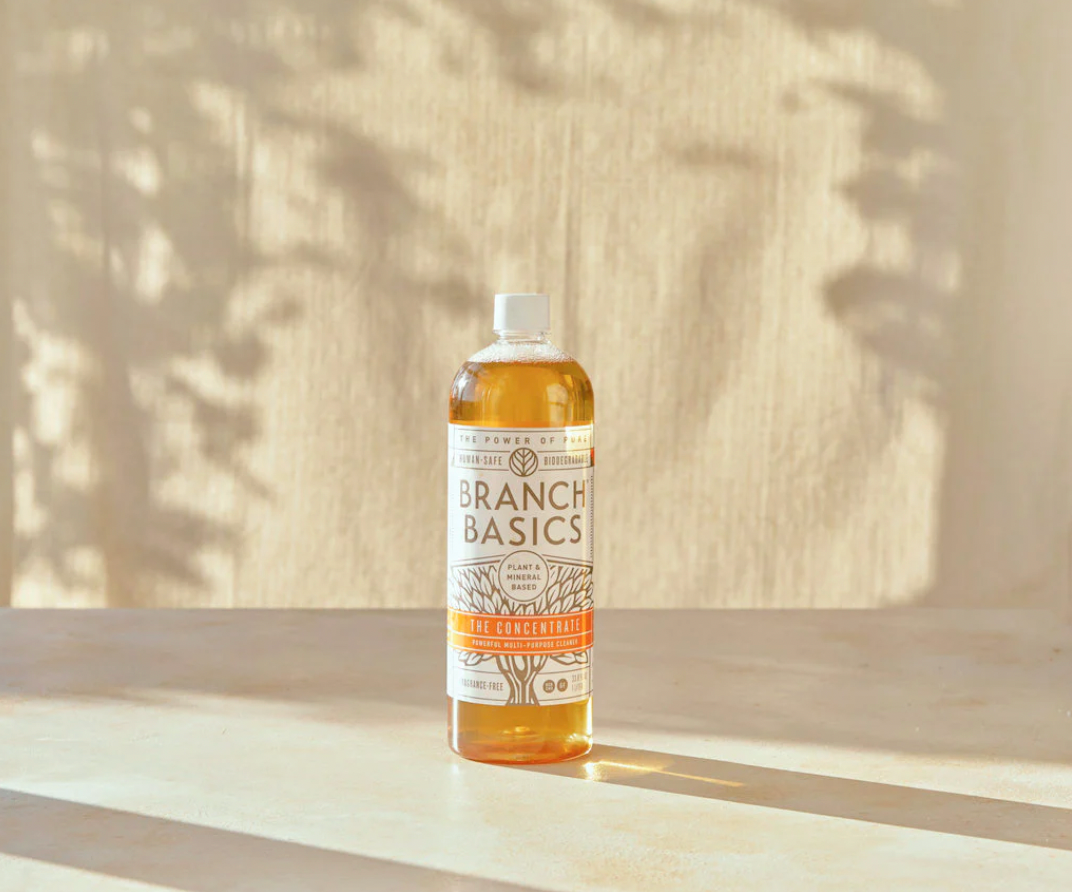Coco Glucoside vs. Decyl Glucoside: What’s the Difference?

Are you curious about the difference between Coco Glucoside and Decyl Glucoside in Branch Basics products?
As avid proponents of label reading and transparency in the cleaning and natural products space, we are excited to dive into this with you!
In this article, you’ll learn everything you need to know about Coco Glucoside and Decyl Glucoside and why we chose to use them in Branch Basics products, including:
- What are natural surfactants?
- What is coco glucoside?
- What is decyl glucoside?
- Similarities and differences between coco and decyl glucoside
- Other types of natural surfactants
What are Natural Surfactants?
Surfactants are an essential ingredient in natural and conventional cleaning products.
The four types of surfactants used in cleaning products are: anionic, nonionic, cationic, and amphoteric.
They work by reducing the surface tension of water, which makes it easier for cleaners to mix with and remove dirt, grease, grime, and other contaminants.
Surfactants are also foaming and wetting agents that help emulsify and break down oils and dirt and promote ease in rinsing and removing from surfaces.
There are different types of surfactants, including:
- Synthetic surfactants: These are chemically derived surfactants. Synthetic anionic surfactants are the category used most commonly in household cleaning and personal care products. They are also considered a forever chemical and cousin of Teflon, which is why they are not used in truly safe cleaning products.
- 100% natural, unrefined surfactants: These include plants with natural surfactant properties, such as Soap Nuts, Shikakai powder, Soapberry, Soapwort, and others. Although these can work well in DIY recipes, they are typically not used exclusively in premade cleaning products due to their inability to provide consistent foaming, stabilization, thickening, and shelf-life.
- Naturally derived synthetic/refined surfactants*: These strike an ideal balance between synthetic and natural surfactants. Naturally derived refined surfactants come from plants, like coconut, and are a safe, ultra-gentle, plant-derived, human-safe family of surfactants. Coco and decyl glucoside fall under this category.
*Important Note for Clarification: The alkyl glucoside surfactant family members are technically correctly identified as naturally derived synthetic surfactants even though commonly referred to as naturally derived surfactants. They are also referred to as naturally derived refined surfactants.
The reason for using the word synthetic in the description is not because they are derived from a petroleum product and highly processed, but because of the number of steps taken to process the natural source - coconut, palm, or rapeseed (canola) oils - to create the surfactant.
This is tantamount to the term “processed or refined food” when referring not to a chemicalized process or chemical addition, but a simple process like taking a kernel of wheat and grinding it into flour. That step of grinding makes a flour product a processed food.
What Is Coco Glucoside?
Coco Glucoside is a naturally derived refined non-ionic surfactant sourced from coconuts.
It is a versatile sulfate-free foaming agent with natural emollient, moisturizing, conditioning, skin softening, and cleansing properties. It is used as a natural alternative to harsher surfactants like Cocamidopropyl betaine and other sulfates.
Coco Glucoside is rated a “2” by the Environmental Working Group, is biodegradable, non-GMO, and considered “low risk” for development and reproductive health.
It’s appropriate for sensitive skin, irritated skin, babies, pets, or allergies.
You’ll find Coco Glucoside in Branch Basics Concentrate, an all-in-one, human-safe, and natural cleaning concentrate designed to replace every cleaning and laundry product in your home.
We chose Coco Glucoside for our Concentrate because it comes from plants and is exceptionally gentle and human-safe, yet super-effective for all types of cleaning and laundry jobs—from cleaning surfaces and floors to removing stains, washing produce, and as a hand wash.
Learn more in: Is Branch Basics Safe? Your Questions Answered.
What Is Decyl Glucoside?
Decyl Glucoside is another non-ionic, naturally derived plant-based surfactant.
It is sourced from coconut or corn and is commonly used as a safe and healthy alternative to conventional sulfates.
Decyl Glucoside used in Branch Basics is biodegradable, non-GMO, non-irritating, non-allergenic-non-drying, non-carcinogenic, and human-safe, comes from 100% renewable and vegan resources, is rated “2” by EWG, is Ecocert and COSMOS approved for certified organic formulations, and is safe enough to use on babies, sensitive skin, or pets.
You’ll find Decyl Glucoside in Branch Basics Concentrate and Dishwasher Tablets, where it’s used as a wetting, cleansing, and foaming agent and stabilizer.
Why do we use both Coco and Decyl Glucoside in Branch Basics Concentrate?
As with synthetic cleaners, human-safe cleaning products often benefit from more than one surfactant to better target a variety of soil and stains.
We combined the two to enhance the cleaning power and versatility of our signature Concentrate.
Learn more in: What Is Decyl Glucoside And Is It Safe For Skin?
What are the Similarities Between Coco And Decyl Glucoside?
Coco and Decyl Glucoside are different surfactants but have much in common.
For example:
- They’re both non-ionic surfactants
- Both belong to the family of alkyl glucosides
- They’re both naturally derived synthetic/refined surfactants
- They do not contain toxic by-products
- Both act as foaming agents
- They both may be sourced from coconut
- They are both human-safe
- Both add viscosity to products
- They’re both rated “2” by EWG
- They’re both effective natural alternatives to sulfates
- Both are suitable for sensitive skin, babies, and pets
What are the Differences Between Coco And Decyl Glucoside?
Coco and Decyl Glucoside are often used together in human-safe, natural cleaning products because their complementary properties work synergistically to enhance cleaning and foaming power.
The main differences are:
- Coco Glucoside is always derived from coconut, while Decyl Glucoside may be derived from coconut or corn.
- Coco Glucoside is particularly good at removing oil and grease.
- Decyl Glucoside foams up quickly, but its foam dissipates more quickly than that of Coco Glucoside. Combining the two adds to a product’s foaming stability.
- Although both are considered very gentle, Coco Glucoside is considered the most gentle of the two.
Other Types Of Natural Surfactants
Coco and Decyl Glucoside are the primary surfactants used in Branch Basics.
However, others fall under the natural surfactant category, including:
Lauryl Glucoside
Lauryl Glucoside is a naturally derived surfactant from palm kernel oil, corn sugar, or coconut.
It is ultra-gentle on even the most sensitive skin and is rated 2 by the Environmental Working Group.
Lauryl Glucoside is used as a conditioner, emulsifier, and foaming agent in natural baby, personal care, cleaning, and laundry products.
Cocamidoproply Betaine
Cocamidopropyl betaine (CAPB) comes from coconuts and is used as a foam booster, emulsifier, thickener, antistatic agent, and rarely an antiseptic agent.
It is considered harsher than Glucoside surfactants.
Cocamidopropyl betaine is rated “5” by the Environmental Working Group due to potential concerns with contact allergies and immunotoxicity. It may be toxic to aquatic life and a concern for the environment. It is believed impurities formed during processing may be the cause, but more research is needed.
We chose not to use Cocamidoproply Betaine in Branch Basics products for this reason.
Capryl Glucoside
Capryl Glucoside is a plant-derived surfactant from corn or coconut and palm oil.
It acts as a foaming agent, cleanser, and surfactant and is appropriate for sensitive skin.
Capryl Glucoside is rated 2 by the Environmental Working Group, is ECOCERT certified, and is biodegradable.
Toss The Toxins With Branch Basics
Few people pay much mind to surfactants, but they are a big part of our lives!
From shampoos and body washes to dish soaps and cleaners, it pays to become aware of what we’re washing down the drain and exposing ourselves to.
That’s why choosing products with natural and safe surfactants is essential.
Branch Basics Starter Kits (available in reusable plastic or glass) contain everything you need to replace every single synthetic surfactant-containing cleaning and laundry product in your home with just one Concentrate.
We also offer Oxygen Boost, a mineral-based surfactant-free bleach alternative, laundry booster, stain remover, and scouring agent, and human-safe plastic-free Dishwashing Tablets.
For more information on surfactants and other ingredients to avoid in cleaning products, check out the following articles:

Marilee Nelson
Marilee Nelson is an Environmental Toxins expert who has spent nearly 30 years advocating for the chemically-sensitive and chronically-ill. She is a Board Certified Nutritionist, Certified Bau-Biologist and Bau-Biology Inspector and specializes in Food As Medicine. She has helped thousands of families and individuals identify, heal and recover from toxic exposures and is on a mission to revolutionize the way American families view their health.








